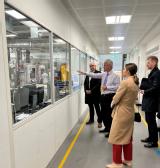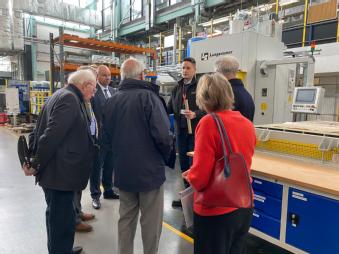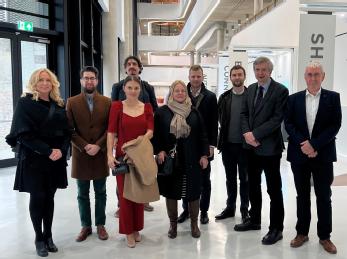WMG News - Latest news from WMG
Members of the Worshipful Company of Engineers visit WMG
WMG, University of Warwick welcomed members of the Worshipful Company of Engineers to the department to discuss the importance of industry working with academia on research and education. The Company comprises leading engineers, and works to promote and develop all aspects of the science, art and practice of engineering.
Professor Mark Williams, Head of Metrology and Visualisation gave a tour of WMG facilities which focused on the important role of CT scanning in battery technology, criminal forensics, and medicine.
Current winner of the Leete Premium Award, Will Naylor presented his PHD work to the group. Will’s research which has been recognised due to its potential to introduce significant change in manufacturing, investigates methods of capturing, transmitting, and delivering high quality, multisensory, 3D data between remote locations.
Professor Paul Jennings ,Director of Research at WMG who led the visit said: “It was a pleasure to welcome members of the Worshipful Company of Engineers to WMG and give them a real insight into our pioneering research and innovation. The importance of collaboration was a key discussion point throughout the day and Will’s work is a true testament to that – his research is helping engineers to seamlessly work together and share ideas around the world.”
Find out more about WMG’s research here: https://warwick.ac.uk/fac/sci/wmg/research/
Members of the Slovakia government visit WMG
Delegates from the Slovakian government visited WMG, University of Warwick for an introduction into the department’s ground-breaking battery R&D and a discussion on the importance of industry and academia collaboration.
A total of eight delegates led by State Secretary, Ministry of Economy, Ján Oravec enjoyed a tour of the Energy Innovation Centre (EIC) by Chief Engineer, Mark Amor-Segan who demonstrated EIC’s facilities to research, develop and test the latest technologies at the forefront of energy storage.

Professor Paul Jennings, Director of Research at WMG, University of Warwick who hosted the visit said: “It was great to be able to meet the delegation and showcase the power of academia and industry working together, demonstrating how we are helping to drive the sector forward through impactful research and new education and skills offerings.”
Find out more about WMG’s energy research here: https://warwick.ac.uk/fac/sci/wmg/research/energy/
Driving commercial opportunity: Intelligent Vehicles in the UK
 Comment from Professor Paul Jennings, Intelligent Vehicles Research Lead at WMG, talks about the commercial opportunities for intelligent vehicles in the UK.
Comment from Professor Paul Jennings, Intelligent Vehicles Research Lead at WMG, talks about the commercial opportunities for intelligent vehicles in the UK.
What's your definition of 'intelligent vehicles'?
'Intelligent vehicles' is a catch-all title for our research because we work on connectivity in vehicles; we work on automation in vehicles; and we work on projects that don't involve either. For instance, intelligence in a vehicle could be a way to achieve improved comfort and convenience features or to improve energy management.
What are the main markets for intelligent vehicles? Cars? Trucks? Public transport?
We're talking all of the above. It's important to remember that the market for intelligent vehicles isn't just so that people can move around more safely, comfortably and conveniently. It's about moving goods, too. Whatever market WMG is working in, however, it has to make sure it's here to solve problems and create new opportunities for customers and for our industry partners. Our role is to help UK companies exploit the significant emerging business opportunities through collaborative research, and through provision of new skills and education programmes.
Who are the main players in the intelligent vehicles market?
It's interesting because things have moved beyond traditional automotive companies now. At WMG, we do work with traditional companies and their supply base, of course; but there are new types of designer-manufacturers on the scene too. For example, in low-speed autonomous transport there are companies such as Aurrigo — the autonomous vehicle division of RDM Group — which designs and manufactures low-speed driverless pods here in Coventry. It is also important that we work with other key sectors too, such as wireless communications, simulation and transport infrastructure. Collaboration with authorities such as Transport for West Midlands is also crucial.
What are the main commercial drivers for companies in the intelligent vehicles space?
I'd put safety at the top of the agenda because, first and foremost, everyone wants to be safe. Then there are lower emissions and better energy efficiency. I don't think we can necessarily expect intelligent vehicles to reduce congestion, but they should be able to give us much better estimates about journey times. Also, there's a chance to make different modes of transports work better together — for example improving links between road and rail.
How can UK companies best take advantage of the commercial opportunities they identify?
The Midlands Future Mobility environment we, and our consortium partners, are creating is very exciting and will give real advantages to UK companies. It's going to be a place where they can come to trial their new vehicles, technologies and services in the real world, with proper public and user-engagement. That's a great opportunity for them to learn more from trials, and have the process made easier for them. It's also good for the Midlands which will experience those new technologies and services earlier than everyone else.
How do you see commercial opportunities developing in the future?
I think the whole supply chain will change dramatically. There will be an increasing importance on software, sensors, perception systems and connected components. But I think, over time, business models will change more dramatically as transport becomes more of a mobility-focused service industry, with customers buying 'journeys' rather than 'vehicles'.
WMG to lead new £11 million programme partnering with Highways England to evaluate connected and autonomous vehicles
WMG, at the University of Warwick, is leading a new £11 million programme to evaluate connected and autonomous vehicles which will work with a range of partners including Highways England. It further establishes Coventry, Warwickshire and the West Midlands as the heart of connected and autonomous vehicles research and development in the UK.
The £11 million Meridian 3 programme is funded by Innovate UK and brings together Highways England with Midlands Future Mobility, which is led by WMG at the University of Warwick.
This addition to the Midlands Future Mobility project will enable connected and autonomous vehicle technologies, that have been developed using simulation and test tracks, to then be evaluated on roads in real-world driving situations, providing invaluable additional learning that will enable them to become a commercially viable and desirable means of road-transport.
New £2.7m research programme will use Artificial Intelligence powered pedestrians and other road users to test autonomous vehicles
 WMG at the University of Warwick have just begun work with a consortium of 11 organisations led by Latent Logic in Oxford on a £2.7 million UK government funded project to create a highly accurate virtual reality simulator environment, including artificial intelligence (AI) trained models of pedestrians and road users, to test connected and autonomous vehicles (CAVs).
WMG at the University of Warwick have just begun work with a consortium of 11 organisations led by Latent Logic in Oxford on a £2.7 million UK government funded project to create a highly accurate virtual reality simulator environment, including artificial intelligence (AI) trained models of pedestrians and road users, to test connected and autonomous vehicles (CAVs).
OmniCAV, which was awarded funding as part of a competition run by the Centre for Connected and Autonomous Vehicles (CCAV) and Innovate UK, will be fed by highly detailed scans of real roads, traffic camera data, accident data and near-miss analyses. These inputs will be used to create a high-fidelity model of real-world roads, which will be populated with realistic artificial intelligence (AI) based road users. This model will used to create an extensive open-access library of VR simulator scenarios to test connected and autonomous vehicles.
OmniCAV will lay the foundations for the development of a comprehensive, robust and secure simulator, aimed at providing a certification tool for CAVs that can be used by regulatory and accreditation bodies, insurers and manufacturers to accelerate the safe development of CAVs.”
Young Alumni Achiever Award for WMG Principal Engineer
 Principal Engineer Siddartha Khastgir has been presented with a prestigious Young Alumni Achiever Award from the Indian Institute of Technology (IIT) Kharagpur, India.
Principal Engineer Siddartha Khastgir has been presented with a prestigious Young Alumni Achiever Award from the Indian Institute of Technology (IIT) Kharagpur, India.
Siddartha graduated from IIT in 2011 before going on to complete a PhD at WMG, under the supervision of Professor Paul Jennings , on developing testing methodologies for ensuring the safety of autonomous vehicles. He is now a Principal Engineer within our Intelligent Vehicles capability.
Formula 1 driving simulation technology could help put the UK on the fast track to self-driving vehicles
A new research programme by WMG at the University of Warwick, and XPI Simulation, co-funded by Innovate UK, is examining the potential for applying the simulation technology used to train Formula 1® drivers for the testing and certification of autonomous vehicles. The market for such vehicles is expected to reach £52 billion by 2035, according to government figures.
The new research could dramatically reduce the time to market, helping manufacturers to achieve the UK government’s vision for self-driving vehicles to be operating on our roads as early as 2021.
Several manufacturers are already testing their vehicles on public roads, with mixed results. One of the problems is the volume and repeatability of testing. Carrying out such testing on controlled tracks or on-road presents significant cost and safety challenges – as well as requiring huge amounts of mileage to be driven to gather evidence.
Midlands Future Mobility in the driving seat to transform the environment for connected vehicles
 Midlands Future Mobility will use over 50 miles of Coventry and Birmingham roads to establish the Midlands as a world class UK centre for the development, and evaluation of, connected and autonomous vehicles (CAV) and related technologies and services.
Midlands Future Mobility will use over 50 miles of Coventry and Birmingham roads to establish the Midlands as a world class UK centre for the development, and evaluation of, connected and autonomous vehicles (CAV) and related technologies and services.
Midlands Future Mobility will be at the heart of the UK’s transport network, making a significant contribution to the UK’s national transport strategy, and will play a crucial role in shaping the transport sector. It will firmly establish the UK’s presence in the connected and autonomous vehicle market, and contribute to the UK’s Industrial Strategy.
The specially selected networked roads cover a range of representative areas and will be the largest, most diverse testing environment in the UK, with the deployment of new roadside infrastructure including smart vehicle monitoring, data analytics and 5G ready wireless infrastructure. By using real-world environments Midlands Future Mobility will enable a variety of industries to test new vehicle technologies and services, with the aim of improving integration.
WMG experts line-up for Emerging Technology Conference
Our team of experts will be out in force at the New Statesmen Emerging Technology Conference on 20th November at the Institute of Engineering and Technology (IET) in London.
The Conference programme is split into two streams, one tackling intelligence, software and machine learning, and the other infrastructure, advanced materials and robotics. The event brings together engineers, data analysts, IT and technology specialists, and senior management professionals, from across a variety of sectors, to discuss and debate technologies of the future.
Midlands roads to be UK autonomous vehicle testbed
 Roads in Coventry and Birmingham are set to become a world-class UK testbed for developing the next generation connected and autonomous (CAV) vehicles, thanks to a new £25m programme of investment being led by WMG at the University of Warwick.
Roads in Coventry and Birmingham are set to become a world-class UK testbed for developing the next generation connected and autonomous (CAV) vehicles, thanks to a new £25m programme of investment being led by WMG at the University of Warwick.
The pioneering venture, undertaken by a consortium of research and industry partners, will make UK roads ready for CAVs by developing wireless networks, analysing how vehicles behave in real urban environments and involving the public in their evaluations.
The UK Central CAV Testbed will be based on 80 kilometres of urban roads in Coventry and Birmingham, creating a world-leading connected infrastructure and eco-system, and positioning the Midlands as a centre for cutting-edge automotive and communication technologies.


